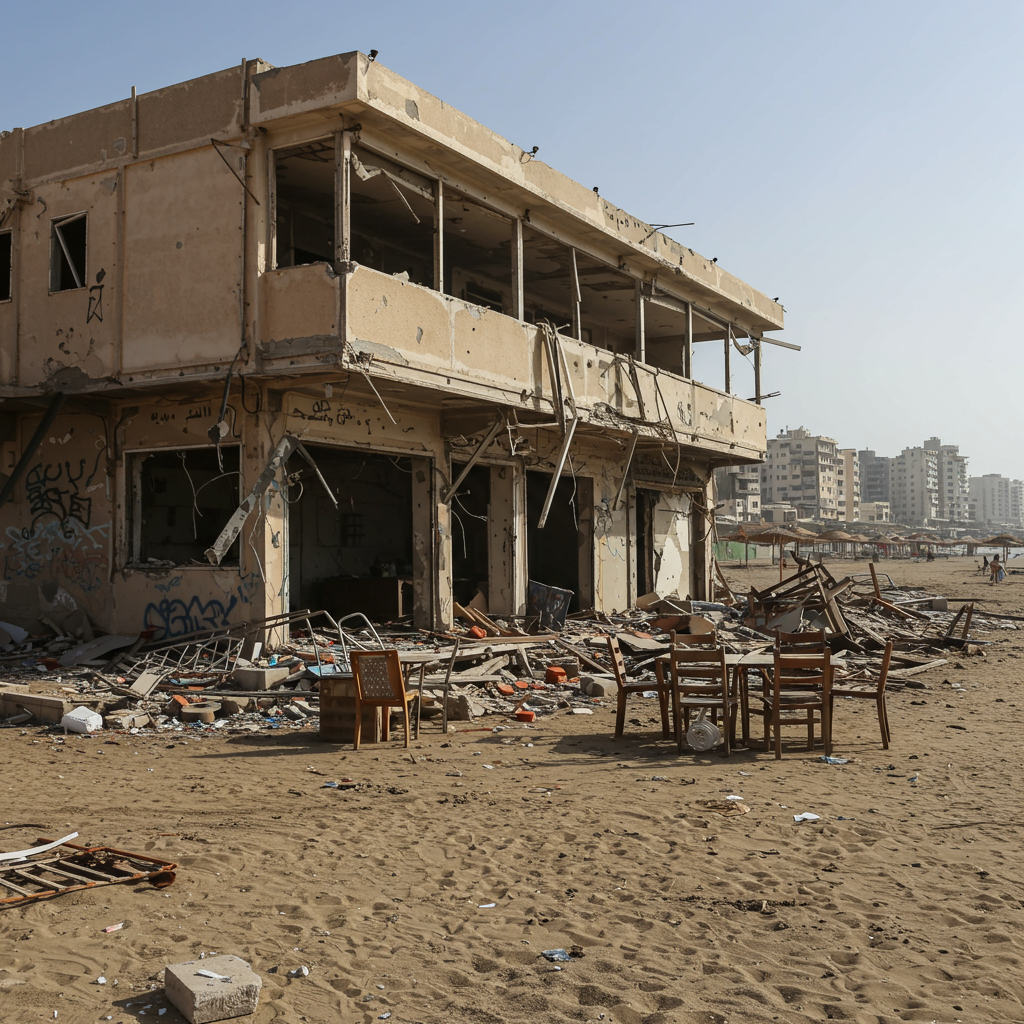reports emerging from Gaza detail intense israeli military operations that have tragically resulted in significant civilian casualties. Among the most devastating incidents reported is a strike on a seaside cafe in Gaza City. This attack reportedly killed dozens of people who were seeking refuge or simply gathering in a common space. Multiple sources indicate the strike occurred around June 30, 2025, hitting the al-Baqa Cafe on Gaza City beach.
Initial accounts cited varying casualty figures, with some sources reporting over 30 deaths, while others indicated at least 21 or twenty-two fatalities. Tragically, those killed included women, children, and even journalists. The cafe, known as a vital spot for internet access and leisure, was instantly transformed into a scene of profound horror. This sudden strike occurred without warning, highlighting the extreme dangers civilians face across the territory. Emergency teams immediately began searching through the wreckage, desperately working to recover victims trapped under rubble.
Escalating Military Actions Across Gaza
The cafe attack is part of a wider pattern of intensified Israeli military actions throughout Gaza. Recent days have seen some of the heaviest bombardments in weeks. Israeli forces have launched widespread air strikes and fired artillery across numerous areas. Early reports suggested at least 85 people were killed since dawn on the day the cafe was hit. Other sources placed the day’s death toll from Israeli forces higher, with reports of at least 60 or 67 fatalities across the territory.
Heavy fighting has been reported in areas like the eastern suburbs of Zeitoun in Gaza City, where Israeli tanks pushed forward and shelled several locations. Aircraft bombed at least four schools in the area shortly after families who had been sheltering there were ordered to leave. Residents have described the bombardments as incredibly intense, feeling like earthquakes. New evacuation orders have been issued for large parts of northern Gaza, including central Gaza City, directing civilians to move south as the military signals expanded operations targeting hamas militants.
Diplomatic Efforts Amidst Rising Tensions
Amidst the escalating conflict on the ground, diplomatic activity is also intensifying. US President Donald Trump is scheduled to meet with Israeli Prime Minister Benjamin Netanyahu at the White House on July 7. This high-level meeting is expected to address critical regional issues, including Iran, Gaza, and Syria. The US government is reportedly pressing for a ceasefire agreement between Israel and Hamas.
Further diplomatic engagement includes the visit of Israeli Strategic Affairs Minister Ron Dermer to Washington. He is scheduled to hold talks with Trump administration officials, including Middle East envoy Steve Witkoff, Secretary of State Marco Rubio, and Vice President J.D. Vance. Discussions are anticipated to cover the situation in Gaza and Iran. There is some uncertainty about whether the US administration intends to pressure Israel regarding its objective of toppling Hamas rule in Gaza, a move that could potentially pave the way for ending the conflict and securing the release of hostages.
US Military Support and International Scrutiny
The United States continues to underscore its commitment to Israel’s security. The Pentagon recently announced the approval of a significant $510 million arms sale to Israel. This deal includes thousands of bomb guidance kits. Specifically, the sale comprises 3,845 Joint Direct Attack Munition (JDAM) guidance kits, along with additional guidance kits for the MK 82 bomb.
The US Defence Security Cooperation Agency (DSCA) stated that this sale is “vital to U.S. national interests.” Boeing, based in St Charles, Missouri, is listed as the principal contractor for the deal. This approved sale comes at a time of heightened international scrutiny regarding US military support for Israel, particularly as civilian casualties continue to rise in Gaza. The ongoing conflict and its humanitarian impact have fueled significant debate globally regarding the provision of military aid.
Civilian Casualties and Aid Challenges
Heartbreaking accounts from Gaza detail the immense toll on civilians. In addition to the cafe strike, witnesses, hospital officials, and health authorities have reported other mass casualty events. Tragically, around 22 people were reportedly killed by gunfire while desperately seeking food aid at distribution points. Medics also reported a separate naval strike on a port in Gaza City, which killed at least 21 Palestinians and wounded 30, primarily women and children.
These incidents have drawn international concern. The German government, for instance, has expressed alarm about the high death toll among Palestinian civilians gathering near food distribution points. Reports from Israeli military officials themselves have surfaced, acknowledging instances of firing at Palestinian civilians waiting for aid, even when no immediate threat was present. These officials reportedly admitted receiving directives to open fire on “starving” civilians at aid sites. Since late May, nearly 600 Palestinians have reportedly been killed while trying to access aid. Officials have also acknowledged civilian deaths resulting from “inaccurate and uncalculated” artillery fire.
Internal Israeli Discussions and Hostage Situation
Internal discussions within Israel reflect the complex challenges of the conflict. The condition of Israeli hostages held in Gaza is described as “very grave,” with their abuse reportedly worsening. IDF Chief of Staff Lt. Gen. Eyal Zamir has expressed support for defeating Hamas but cautioned that deepening the operation now could jeopardize the hostages. This stance has reportedly led to clashes with figures like Finance Minister Bezalel Smotrich and National Security Minister Itamar Ben-Gvir, who argue that defeating Hamas and freeing hostages can be pursued simultaneously. Smotrich has also accused the army of failing to prevent Hamas from seizing humanitarian aid.
The Hostage and Missing Families Forum issued a strong response to General Zamir’s warning, describing it as raising a “black flag” and emphasizing the critical state of the hostages. Ministers have yet to make a final decision on ongoing negotiations with Hamas, though a determination is expected soon. The differing perspectives highlight the intense pressure faced by leadership in balancing military objectives with the paramount need to secure the release of captives.
Broader Context and Related Developments
The conflict in Gaza is unfolding alongside several other significant regional and political developments. Reports indicate instances of settler violence in the West Bank, including attempts to break into IDF bases and setting fire to a military site. IDF leadership has condemned these actions, warning of potential escalation without swift intervention.
Other news items connected to the broader situation include the tragic death of an 82-year-old woman in Colorado from injuries sustained in an attack on a rally for Israeli hostages. A young Palestinian administrative prisoner has died in an Israeli hospital, the seventh death in that specific prison. Domestically in Israel, former IDF Chief of Staff Gadi Eisenkot has resigned from the opposition National Unity party. On a different foreign policy front, the Trump administration has also announced plans to terminate broad sanctions on Syria, although key sanctions targeting the former Syrian President will remain. These varied events collectively illustrate the wide-ranging impact and complex interconnections surrounding the ongoing conflict and regional dynamics.
Humanitarian Crisis Deepens
The humanitarian situation in Gaza continues to be described as dire and “unbearable.” The immense suffering of civilians is significantly straining Israel’s relationships with European nations. Many international voices are calling for an immediate ceasefire, the unconditional release of all hostages held by Hamas, and guaranteed, uninterrupted access for humanitarian aid into Gaza.
Israel maintains that it facilitates the entry of aid but accuses Hamas of diverting or stealing supplies, a claim Hamas denies. Hamas, in turn, accuses Israel of using hunger as a weapon of war. Aid agencies and human rights organizations continue to raise alarms about the severe shortages of food, water, medicine, and shelter, compounded by mass displacement. The United Nations estimates that over 80% of Gaza is now either under evacuation orders or designated as a militarized zone, severely limiting safe areas for civilians.
Frequently Asked Questions
What happened at the al-Baqa Cafe in Gaza?
According to multiple reports, an Israeli strike, described variously as a naval strike, missile attack, or airstrike, hit the al-Baqa Cafe on Gaza City beach around June 30, 2025. The cafe was a gathering place for civilians. The attack resulted in numerous fatalities, with casualty figures varying between reports but totaling at least 21 and potentially over 30. The victims included women, children, and journalists.
What is the current humanitarian situation in Gaza?
Gaza is facing a severe humanitarian crisis. Intense military operations have led to widespread destruction and mass displacement, with nearly all of the 2.3 million residents displaced. Aid access is contested, with reports of severe shortages of essential supplies like food and medicine. Tragically, hundreds of Palestinians have reportedly been killed while attempting to access aid distribution points.
What diplomatic efforts are currently underway regarding the Gaza conflict?
Significant diplomatic activity is ongoing, particularly involving the United States. US President Donald Trump is scheduled to meet with Israeli Prime Minister Benjamin Netanyahu at the White House on July 7 to discuss regional issues, including Gaza. Israeli Minister Ron Dermer is also visiting Washington for talks with US officials. The US is reportedly pushing for a ceasefire deal between Israel and Hamas, though key disagreements remain between the parties on the terms for ending the conflict and releasing hostages.
Conclusion
The situation in Gaza remains critically volatile, marked by intense military engagements, devastating civilian casualties, and a deepening humanitarian crisis. The tragic strike on the al-Baqa Cafe serves as a stark reminder of the daily dangers civilians face. While diplomatic efforts continue behind the scenes, including high-level meetings planned in Washington, the immediate reality for residents across Gaza is one of relentless attacks, displacement, and hardship. The conflicting reports on casualty numbers and specific events underscore the difficulty of obtaining clear information amidst the ongoing conflict. As international scrutiny intensifies and internal debates persist within Israel, the path toward de-escalation and addressing the profound humanitarian needs remains complex and uncertain.



